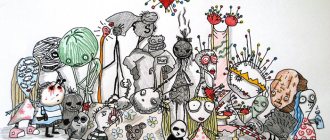Any person from birth goes through a developmental path, that is, changes physically, mentally, psychologically. The fastest stage is considered to be up to a year. At this time, any parent knows what his child should know and be able to do. After all, the baby’s whole life depends on it. But for some reason, after the one-year mark, many cease to be interested in the peculiarities of psychophysical development, believing that the worst is over. Forgetting that any disease is easier to prevent than to treat. And knowing the psychology of children aged 7–8 years, the characteristics of the psychophysical development of children, parents will be better able to understand the specifics of behavior or correctly respond to emerging problems. After all, child developmental psychology for the period 7–8 years is a tool for parents to understand and solve problems.
Main indicators of children's physical development
Indicator name | 7 years | 8 years |
| Height | 121.2 cm | 126.9 cm |
| Body mass | 22.9 kg | 25.5 kg |
| Head circumference | 52 cm | 58 cm |
| Chest circumference | 52 cm | 59 cm |
| Breathing rate | 20–25 breaths per minute | |
| Heart rate | 85–100 beats per minute | |
| Arterial pressure | 90/60 | |
| Muscle volume | 25% body weight | |
| Heart weight | 92.3 grams | |
Additional age-related features of the development of children 7–8 years old:
- Changing the proportions of the head and body, bringing the indicator closer to an adult.
- Increased limb length by 2 times.
- Rapid development of the musculoskeletal system, especially the spine. Bones are amenable to changes in shape and structure. A colossal load on the skeleton caused by prolonged participation in classes where you have to hold a static pose for a long time. This makes it difficult for children to sit still. Hence the risk of problems with posture.
- The beginning of ossification and a rapid increase in the volume of large muscles. Cross-country exercises, jumping exercises, and roller skating will be useful.
- The ability to instantly orient yourself and adjust while performing exercises.
- Insufficient strength of the small muscles of the hands, leading to complaints of pain and fatigue when writing.
- Changing abdominal breathing to chest breathing, strengthening the diaphragm.
- Completion of the formation of the lung structure.
- Restructuring the functioning of the immune system, redistributing loads from the thymus gland to the lymph nodes, spleen, tonsils, bone marrow.
- Replacement of front milk teeth with molars.
- Insufficient development of nervous regulation of movement, which leads to difficulties in the accuracy of movements and the speed of their execution.
- Vision as the main controller of the processes of writing and drawing. The main feature is fixing attention on the entire process, and not just on a piece of paper. Excessive tension caused by effort is noticeable.
In a 7–8 year old schoolchild, the body is in the process of growth. Health problems are a common cause of fatigue, poor performance, and poor performance.
How can parents understand that their child is in crisis?
The child tries in every possible way to become an adult, and for this purpose he goes against his parents and contradicts all established rules. In order for parents to understand whether their son is in a state of crisis or not, it is necessary to observe his behavior. If his actions have changed, he has become withdrawn, irritated, it means that a difficult period is going on in his life.
Behavior of children indicating the presence of a crisis in their life:
- does not consider elders;
- insults and shouts at parents;
- does not pay attention to his favorite toys;
- often resists;
- imitates elders;
- behaves aggressively, throws things around, enters into conflict situations with peers.
All that is required of parents during this difficult period is to have patience and endurance. The main thing is to be able to understand your son, allow him to be free and participate in solving family issues. For support, you can use the services of a psychologist for a child 8 years old.
Mental characteristics
Most have mastered conversational skills. The vocabulary and interest in learning unknown words increases. An understanding of the sound difference between speech and pronunciation comes. If the social environment was positive and adults communicated well and for a long time, by the first grade the child can express thoughts, retell stories or animated films in colors.
- The ability to comprehend and analyze what is seen or heard is traced, and the purposefulness of actions is visible.
- The development of perception is characterized by observing, searching, examining, studying.
- Speech helps develop the ability to understand.
- Children are able to name and make the qualities and properties of objects the main ones for themselves, separate them and understand the real connection between them.
- At the age of nine years, perception can become generalizing, and the ability to establish connections in perceived phenomena and events develops.
Examples of joint games for the whole family
Study becomes the leading activity, but games also play an important role in development, relaxation and recreation.
If a child has favorite games, then you should not ban them - as they grow up, they will gradually fade into the background. Games help you switch your mind and take a break from studying.
Outdoor sports games are useful - they allow you to get rid of excess energy and take a break from the educational process. Children of this age are more drawn to team games
During this period, children may be interested in intellectual games and creativity. Acting out skits and children's theater are excellent examples of play activities. Children develop creatively. Acting out scenes is useful for developing memory and imagination.
Examples of games:
- "Barbell". Allows you to relax and relieve tension. Imagine that there is a barbell on the floor. You have to bend down, take it, take a breath and lift it up. Imagine how hard it is. Then slowly lower down.
- Tactile game. Various objects are placed on the table: hard, soft - a piece of fur, paper, a brush, a cube, etc. An adult passes the object along the child’s hand and asks to talk about the sensations.
- “Freeze in the desired figure . Training attention and movement coordination. It's more fun to play in a group. Everyone moves in a circle, when the leader claps his hands, you must freeze in a certain position. For example, one clap - stork pose, two - bear, three - resume movement.
Development of thought processes
Thinking moves from algorithm to algorithm, and in the end, verbal thinking begins to develop. The ability to think figuratively is visible, but the adult logic of judgment has not been acquired. By the end of the period, children will be able to generalize and make connections. This is important for the development of mental abilities. Most intellectual problems are solved with the help of imaginative thinking, which helps to understand the essence of the problem, draw parallels with reality and control its solution.
Most will easily imagine an object in their imagination and highlight its main features. The beginning of the formation of thinking is noticeable, helping to reproduce what is seen in the form of diagrams, drawings, plans. Thanks to this type of thinking, an understanding of the symbols of words in a sentence or mathematical operations will appear. The foundations of algorithm-based thinking are beginning to take shape. This type of thinking is the main thing for an adult individual. Characteristic is an understanding of the simplest cause-and-effect relationships and the ability to use phrases “if... then.”
Recommendations for development:
- composing words from given letters;
- composing sentences from given letters;
- solving puzzles.
It is important to remember that you need to complete all tasks in a playful way, coming up with exciting exercises.
Unwanted actions from parents
How easily the crisis will pass depends on the behavior of the parents and other adults around the child. Below are recommendations for parents:
- Take your child to school no earlier than 7 years old.
- Make adequate demands. Excessive school load leads to serious negative consequences.
- No attempts to control the child’s actions or overprotectiveness. You need to give your baby space to do his own thing.
- Aggression is unacceptable.
- If your performance is poor, you need to show maximum calm and try to find out the reasons.
Memory properties
It is typical for memory to develop spontaneously and consciously. Children easily learn the school curriculum, which is of interest, designed in the form of a game, associated with colorful visual pictures or images. The development of mechanical memory, which children use to memorize texts, is noticeable, replacing the process of understanding and mastering school material. If in elementary school the volumes of information are small, and mechanical memory is able to cope with them, then in middle school it will not be enough. This will lead to significant difficulties as the curriculum becomes longer and more complex. Therefore, it would be correct to improve semantic memory. It will allow you to learn how to use a huge number of memorization techniques. And mental activity will become inextricably linked with semantic memory.
Recommendations for development:
- memorizing poetry;
- reading and retelling what was read and heard;
- listing the items shown in the picture;
- teaching dancing and other movement games.
Recommended Actions
In order to get through this difficult period faster, experts recommend adhering to the following rules:
- It is better to show the child the school, its attributes in advance and tell about the order that the child will need to follow. You can take a walk around the school, look into the future class, introduce him to the teacher. Regular stories about school will allow him to adapt much faster, because he will already be ready for what awaits him.
- Try to listen to the baby’s opinion and his arguments.
- Lift some restrictions. Let the baby show independence
- Give your baby more freedom of action.
- Do not point out, but convince by giving arguments.
- Praise for any achievements.
- Reward for good deeds and grades.
- Give your child some responsibilities. For example, cleaning the room, washing dishes.
Features of attention
This mental feature is the most important; the learning process is based on attention. Previously, children could not concentrate on monotonous actions, but at seven years old this is not an impossible task. But involuntary attention continues to lead. Any stimulus can serve as a distraction. The average duration of concentration is 10–20 minutes. Difficulties arise with switching attention between tasks. Children are individual, each one develops attention differently. Some can quickly switch from task to task, but are unable to maintain attention for a long time. Others may meticulously, very carefully work on a solution, but take a long time to switch to solving the next problem.
The properties of attention are not equally amenable to training and development, but they can and should be developed. This must be done in order not to let this process take its course. Only by the age of 9–10 can you count on perseverance and concentration, which will allow you to complete tasks for a long time. Until this time, voluntary attention will prevail, switching to an external stimulus. Because of this mental property, the best way to deliver educational material is through colorful aids and materials.
Recommendations for development:
- games of dominoes, lotto;
- search for drawn identical objects depicted in the same picture;
- searching for differences between two pictures that are identical at first glance.
The crisis through the eyes of a child.
Try to remember what it was like to be a 7-year-old child. What feelings did you experience and what did not suit you in the behavior of your parents?
Let's say you are 7 years old. You came to school for the first time, where, by the way, you need to get up early and pack your briefcase every day in the evening. Starting from September 1, everyone around keeps repeating that you are now an adult. And what this means, you still cannot understand. After all, your mother packed your briefcase, and you go to the line hand in hand with your father.
Here you meet your future classmates, whom you definitely need to meet. You came to school to socialize, and not to sit in the corner. And if you don’t like someone, what should you do? – do not communicate, respond to minor insults in kind (or start crying). But no, I’m an adult now, we need to look for a compromise to resolve the conflict. And... you can’t yet.
Then, your parents meet you from school, and you, upset by the first quarrel/fight, go home and think: “Should I tell my parents about this incident or am I too old for such weaknesses?”
This is how a child’s 7-year-old crisis feels. Constant contradictions, the desire to become an adult and make adult decisions. At the same time, it is impossible to fulfill one’s desires due to such a small age and experience.
Relations with society
Coming to first grade, the understanding of reality undergoes significant changes. If at an early age only parents acted as significant adults, now another one appears - the teacher. Based on these relationships, subsequent relationships with others are now built. Student-teacher connections are an indicator of the quality of living conditions. Achievement comes first. The teacher acts as an adult who is unquestioningly listened to and obeyed. The appearance of sneaks is typical, since relationships with each other are built from the position of attitude to the teacher’s rules.
Relationships with adults come down to the following algorithm: the adult targets, checks, and evaluates actions. At first, the manipulations are carried out jointly, then the adult’s participation in the process decreases until it stops completely.
Experience in communication and conflict resolution is acquired and accumulated. Teaching patience, the ability to act together, and the ability to forgive. Developing the ability to understand the desires of another, solve common problems, and look at actions through someone else's eyes.
Duration of the crisis period
The beginning of the crisis period is associated with obtaining the status of a schoolchild, which implies significant changes in the child’s living conditions: a new team, obligations, skills. Based on the research, it has been revealed that this period usually lasts several months, depending on the characteristics of the particular child and the behavior of the parents.
Several stages of the crisis can be distinguished:
- the child realizes the need to go to school, therefore he will grow up and become more important;
- the baby tries to master his emotional state and begins to communicate more calmly;
- full awareness of the new status.
Major psychological changes
The main psychological changes are:
- The desire to organize all aspects of your life. In everything that a child encounters, there is a desire to identify patterns into which the world around him can be placed. There is a strong belief that surrounding objects, things, and phenomena are created by people. There is a tendency to fantasize, invent, compose, and construct global theories. Knowledge comes from adults or television. Attitudes and ideas about the world around us change radically the moment they arrive at school, since in reality it turns out that the main activity will be solving elementary problems instead of global ones. Now you can see the entire discrepancy between cognitive desires and reality.
- The ability to distinguish good actions from bad actions. Knowledge develops along with aesthetic taste. An equal sign is put between “beautiful” and “good”.
- The tendency for deliberate actions to predominate. Control over one’s desires is exercised from the position of “will they punish or praise” and from the position of personal promises. These qualities contribute to the development of perseverance and the ability to achieve goals.
- The emergence of a desire to control oneself and one’s actions based on a model.
- The formation of the process of realizing the limitations of one’s capabilities. This is the birth of self-esteem. External manifestations become internal experiences.
- The emergence of an understanding of mental processes and a system of scientific knowledge. There is an awareness of how strong changes have occurred as a result of studying.
Before school started, role-playing games were the main activity. Now they fade into the background, their place is taken by study. The development of this type of activity will continue throughout the entire period of study, but the foundation on which the possibility of personal development depends is laid precisely in primary school. Academic performance is the main indicator by which they are assessed. It reflects status that affects self-esteem and self-esteem. Academic achievement, understanding of what a child is capable of, how he can cope with assigned tasks, has a beneficial effect on the formation of self-esteem. If it is not formed, self-esteem decreases and a feeling of inferiority arises in relation to peers.
This is due to the fact that during the learning process attention is focused on the desire to change oneself. You monitor your performance and internal changes. If the result is satisfactory, it means that the immersion in study was complete. This process will develop into an independent activity, although it was initially organized by an adult.
Reasons for changes in the character and behavior of 7-year-old children
Boys and girls of 7 or 8 years old think that if they went to school, they have already become adults. The child wants to make decisions and perform actions independently. If parents do not take his opinion into account, forcing him, for example, to wear clothes he doesn’t like, the seven-year-old begins to resist. The reason for this behavior is a change in values, a change in understanding of the world and awareness of one’s role in society.
Seven-year-olds are losing their spontaneity. Their mood depends little on external factors. They behave the way they want. Sometimes a seven-year-old's behavior does not correspond to the situation. The reason is the desire to free yourself from the psychological burden from adults and to assert yourself. This problem is more typical for boys. Girls behave more restrained and rarely show aggression or inappropriateness in public.
The instability of a child’s psyche may be caused by the desire to become a leader. The seven-year-old wants to be like the characters from their favorite movies, but they always solve problems using force.
Sometimes children perceive the outside world as an aggressor who wants to offend them. They expect trouble from their peers or parents. An attack is considered the way out of this situation. Children behave too emotionally, defending themselves from possible punishment. A child who lacks the love and warmth of his parents may deliberately be rude to his elders or offend his peers.
Age difficulties
The crisis does not have a clear link to age; it is associated with the moment of starting school and ranges from six to eight years. It is not so much the objective changes in the child’s life that influences, but rather the subjective attitude to the current situation.
Main features:
- Restructuring the perception of your place in relationships.
- The birth of one’s own self. An understanding of one’s place in the world of relationships begins. There is a revaluation of values. Past hobbies and motivations fade, new ones take their place.
- Change of emotional life. Previously, emotions were short-lived and not particularly remembered; criticism did not cause much distress and did not affect self-esteem. Now everything has changed, the immunity to criticism has weakened.
- Generalization of one’s own experiences, leading to the emergence of a logical explanation of feelings. Experiences seem difficult, complex, and carry deep meaning, which leads to the emergence of an inner life. She will lead the action.
- Analysis of the situation before action, reasoning. The likelihood of achieving a positive result is weighed.
- Loss of childish naivety and openness.
- Learning the ability to hide painful feelings, disguising them under a mask of indifference. Despite the desire to show their emotions to others, or to follow fleeting whims, the outer shell of the child differs from the inner experiences. A clear manifestation of this division is the artificiality of emotions and mannerisms of behavior. They will pass after entering a new age period.
Symptoms
Parents themselves can identify the psychological characteristics of this period. Each has its own logic.
The child stops obeying subconsciously, tries to insist on his opinion, refusal to follow parental orders helps development. Punishment is undesirable; even a calm explanation rarely helps. It's better to try to step away temporarily.
Stubbornness is also a symptom of a crisis period. The baby denies refusals, becomes demanding and persistent. In this way he asserts himself. The goal itself is not important, the main thing is the process of demand.
The consequence of the first symptoms is self-will. The child wants to do everything on his own. The best way out is to try to direct energy in the desired direction: provide limited freedom of choice, give simple tasks. For example, choosing clothes, food from several proposed options.
Initial signs may be noted by the age of six. Closer to eight years of age, symptoms become more smoothed out.
Main mistakes
In order not to aggravate the crisis and not to lose the trust of the child, it is important for parents not to make a number of mistakes:
- Physical punishment. At the same time, the baby experiences humiliation, begins to fear his parents, and loses trust. Physical punishment contributes to a decrease in self-esteem; a younger student may become timid and insecure, in order to avoid reprisals, he begins to lie to his parents, hiding various facts, for example, failures in studies, problems at school, with peers, and mistakes made.
- Criticism: “you are doing poorly,” “you can’t do anything,” “you are a loser” - the child will become firmly established in this opinion, because the opinion of his parents is still important to him. As a result, motivation to study decreases, the individual feels like an outcast, unworthy of rewards, and problems begin with self-identification among peers.
- Forbid communication with a specific boy or girl, saying that he is bad, unworthy, of their dysfunctional family.
- You cannot say one thing today and change your mind tomorrow: “You are already an adult, you must fulfill such and such duties,” and the next day: “You are small, you cannot do this.”
- Compare with other children, say that the child studies and behaves worse, other children are better. This reduces self-esteem and motivation.
- You can't make fun of people for mistakes or blunders. If a child did something wrong, you need to calmly explain to him how it should have been done or why it should not have been done.
- Raise your voice. The child becomes nervous, motivation to study decreases, and hysterics are possible.
Psychologist's advice
- From childhood, teach your daughter to work and order.
All this will be useful to her in adult life. You can start with small things - dusting, arranging things in the closet, watering the flowers. The best way is to turn it all into a game or competition with mom.
Then move on to more complex ones: teach the girl how to properly wash dishes, wash clothes, vacuum the floor. Try to ensure that your daughter does not perceive household chores as punishment or does them under pressure.
- Always listen carefully to what your girl tells you.
Women are more emotional creatures than men. It is important for them to share what is bothering them. When a girl is listened to, she feels important, needed and loved.
- It is important for girls to be admired, proud, and set as an example. Women's self-esteem largely depends on the assessment of the people around them. Therefore, celebrate your daughter’s real achievements, praise her for her achievements and do not focus on her failures.
- Neurophysiologists have long proven that girls have much higher developed skin sensitivity than boys. That’s why physical contact is so important for them, especially with loved ones. Hug and kiss your daughters more, it will only benefit them!
- Do not forget to pay attention to the girl’s physical development.
Choose the appropriate type of activity for her. This could be sports or rhythmic gymnastics, dancing, swimming, or athletics.
- Tell your daughter about the rules of safe behavior and how to protect yourself if there is danger. The girl should know that you can come to her aid in any situation, the main thing is not to be afraid to tell everything to mom and dad.
Keep your daughter safe anytime, anywhere. Always know where she is, what is happening around her and receive an instant SOS signal if necessary using the “Where are my children” application.
- Forget about physical punishment and strict educational measures.
Girls are especially sensitive to this. A future woman accustomed to violence will consider it normal in her own family if her husband raises his hand against her.
- If your daughter has committed a bad act, evaluate the act itself, but not her personality. A violent emotional reaction to her parents’ accusation will prevent the girl from realizing where she is wrong.
- Help the little lady realize her own individuality and not conform herself to the supposed standards of girlish beauty that are promoted from TV screens or on the Internet.
- If a girl shows initiative, you shouldn’t cut her down in the bud.
You can’t lay a straw at every step, and your daughter still has a lot to learn on her own. Therefore, encourage her in any attempts to learn and try new things, to cope with difficulties herself and understand the reasons for her mistakes.
Women's nature is multifaceted, so raising a girl (as well as a boy) is not as easy as it seems. Everything you give your girl and teach her should help her become a loving wife, an excellent housewife and a caring mother in the future. Love your daughters, take care of them, but don’t forget to let them go in time!
Raising two girls
In raising two daughters, you need to adhere to the same rules as in raising one daughter (read above) with some features:
- Give equal attention to both daughters
- Don't tell one daughter that the other is better in some way.
- Teach them to be friends with each other. Don't encourage quarrels. Teach to forgive each other and apologize if someone is wrong











